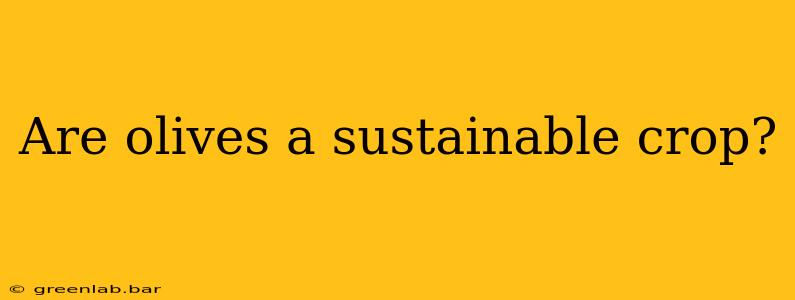The Mediterranean diet, lauded for its health benefits, often features olives prominently. But beyond their culinary appeal, a crucial question arises: are olives a sustainable crop? The answer, like the olive itself, is complex, multifaceted, and depends heavily on farming practices.
The Environmental Footprint of Olive Production: A Balancing Act
Olive cultivation presents a mixed bag regarding sustainability. While the olive tree itself is remarkably resilient and drought-tolerant, requiring less water than many other crops, the overall environmental impact depends significantly on several factors:
Positive Aspects of Olive Farming:
- Water Efficiency: Mature olive trees, particularly in traditional, low-intensity systems, have impressive water-use efficiency. Their deep root systems allow them to access water sources unavailable to other crops. This inherent resilience makes them a relatively water-wise choice in arid and semi-arid regions.
- Carbon Sequestration: Olive groves, especially those managed sustainably, can act as significant carbon sinks, absorbing atmospheric carbon dioxide. The trees themselves store carbon, and the soil under the olive canopy often boasts high levels of organic matter, further enhancing carbon sequestration.
- Biodiversity Support: Well-managed olive groves can support a range of plant and animal life. The varied landscape and presence of hedgerows provide habitats for birds, insects, and other beneficial organisms. However, intensive monoculture olive farming can negatively impact biodiversity.
- Erosion Control: The olive tree's extensive root system helps prevent soil erosion, a significant environmental concern in many Mediterranean regions. This contributes to long-term land stability and soil health.
Negative Aspects and Challenges to Olive Sustainability:
- Water Consumption in Intensive Farming: Modern, high-intensity olive farming, often involving irrigation, can lead to significant water consumption, particularly in regions already facing water scarcity. This is a major sustainability concern.
- Pesticide Use: The use of chemical pesticides and herbicides can contaminate water sources, harm beneficial insects, and negatively impact human health. Sustainable olive farming emphasizes integrated pest management (IPM) strategies to minimize such risks.
- Soil Degradation: Unsustainable practices like intensive tillage can degrade soil health, leading to reduced fertility and increased erosion. Sustainable olive farming emphasizes soil conservation techniques like cover cropping and minimal tillage.
- Waste Generation: Olive oil production generates significant amounts of byproducts, including olive pomace (the solid residue after oil extraction). Improper disposal of this waste can contribute to environmental pollution. Innovative approaches to pomace utilization, such as biofuel production, are gaining traction.
Sustainable Olive Farming Practices: A Path Forward
To ensure the long-term sustainability of olive production, a shift towards environmentally friendly practices is crucial. Here are some key elements of sustainable olive farming:
- Water Management: Employing efficient irrigation techniques, such as drip irrigation, can drastically reduce water consumption. Rainwater harvesting and water recycling can also contribute to water conservation.
- Integrated Pest Management (IPM): Implementing IPM strategies, which focus on preventative measures and biological control, minimizes the need for chemical pesticides.
- Soil Health Management: Employing practices like cover cropping, composting, and minimal tillage helps maintain and improve soil health.
- Waste Management: Finding innovative ways to utilize olive pomace and other byproducts can reduce waste and create valuable resources. Examples include using it as a soil amendment or for biofuel production.
- Agroforestry Integration: Integrating olive trees with other crops or trees can improve biodiversity and enhance ecosystem services.
Conclusion: A Sustainable Future for Olives?
The sustainability of olive farming is not a binary yes or no answer. It hinges on the adoption of responsible farming practices. By prioritizing water conservation, minimizing pesticide use, enhancing soil health, and implementing proper waste management, the olive industry can move towards a more sustainable future, ensuring the continued production of this valuable crop while protecting the environment. The future of olives rests in the hands of farmers embracing sustainable practices and consumers demanding responsible production methods.

